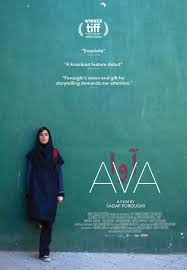As bold as it is angry, in writer/director Sadaf Foroughi’s semi-autobiographical feature filmmaking debut Ava, an eponymous seventeen-year-old girl on the cusp of graduation (played by Mahour Jabbari) struggles to come-of-age amid the repressive surroundings of a hypercritical home and school life in present day Tehran.
Used like a pawn by her Type A doctor mother as well as her more easygoing father who’s frequently out-of-town on business, in an early sequence wherein the two (played by Bahar Noohian and Vahid Aghapoor) argue about Ava as though she were not in the next room but the next town, it becomes obvious that Ava's guardians want radically different futures for their daughter.
While her dad wants to give Ava the freedom to choose her own career, after her seemingly impossible to please mother cruelly cuts Ava off from her best friend and violin in an effort that her daughter not repeat any of her own mistakes, Ava's ability to just keep her head down, obey, and follow orders soon reaches a breaking point.
An award-winning Canadian-Iranian feature fresh off the 2017 film festival circuit, while Foroughi’s work derives a great deal of conflict from its setting in the Middle-East, at its core, Ava is a universally relatable film about female adolescence, peer pressure, and teenage struggle with authority both in and out of the classroom.
And even though it isn’t nearly as successful from a structural standpoint, as many viewers have pointed out, Ava would make a surprisingly excellent double feature to last year’s thematically very similar (and likewise female helmed) Lady Bird.
However, unlike Greta Gerwig's multiple Oscar nominee, Ava bears much more in common with French New Wave titles such as Cleo From 5 to 7 and especially The 400 Blows (to which it pays homage in its final moments) than it does with most English language high school features, which makes sense given Foroughi's educational background pursuing post-graduate film study in France.
Nonetheless there are still some lyrical filmic touches throughout Ava including claustrophobic framing with mirrors and bars (which illustrate the way she’s being increasingly watched and isolated) that wouldn't have been out of place in The Virgin Suicides or Fish Tank.
Yet while it could raise some intriguing post-film discussion about the freedom the movie’s men feel in contrast to the women, Ava’s emotionally exhausting depiction of tyrannical female authority figures grows increasingly repetitive as it continues, particularly because the less three-dimensional some of its characters appear, the less Foroughi seems clear about exactly what it is that she wants to say and why.
Helping to keep it from spinning too far out of control, Ava is augmented by both the poetic edits of fellow award-winning Iranian-Canadian filmmaker Kiarash Anvari as well as Sina Kermanizadeh’s lush cinematography.
And while Ava would’ve undoubtedly been better served with either a shorter running time or sharper script (especially one that better represented Ava's mother's point-of-view for greater empathetic impact), overall it's still an ambitious and auspicious debut from Sadaf Foroughi that promises great things from the filmmaker to come.
Text ©2018, Film Intuition, LLC; All Rights Reserved. http://www.filmintuition.com Unauthorized Reproduction or Publication Elsewhere is Strictly Prohibited and in violation of the Digital Millennium Copyright Act. FTC Disclosure: Per standard professional practice, I may have received a review copy or screener link of this title in order to voluntarily decide to evaluate it for my readers, which had no impact whatsoever on whether or not it received a favorable or unfavorable critique.



















